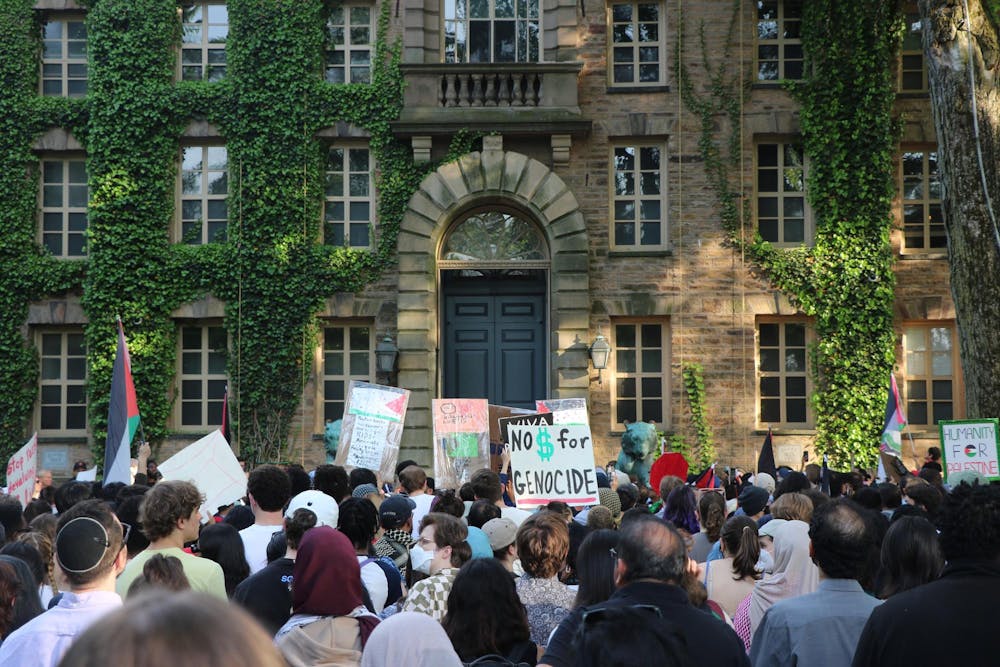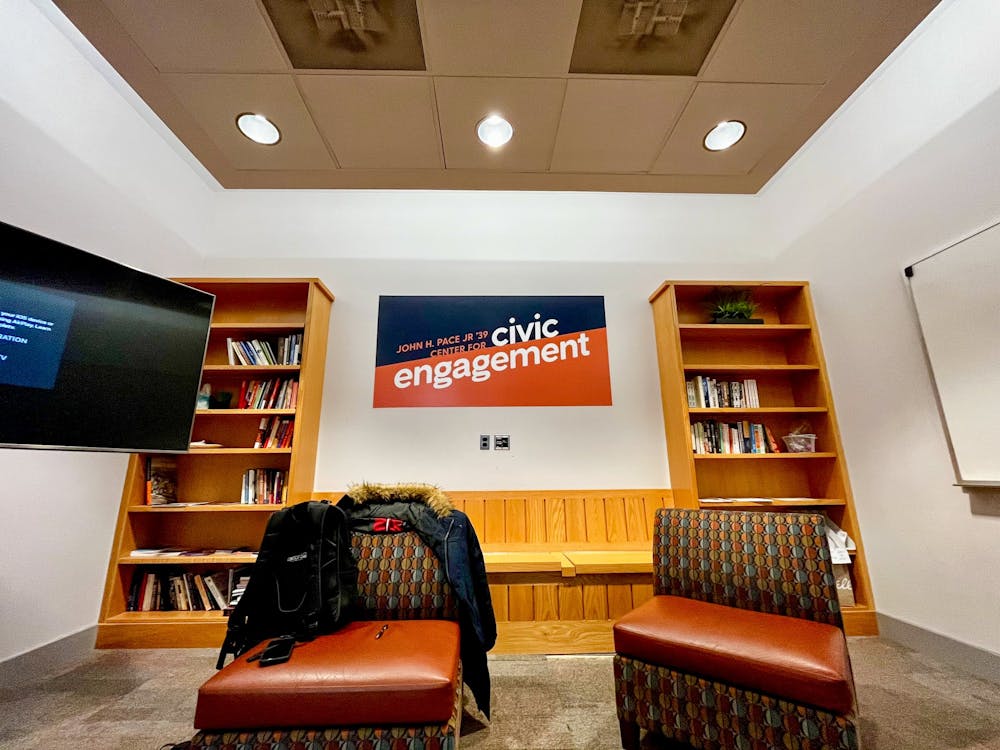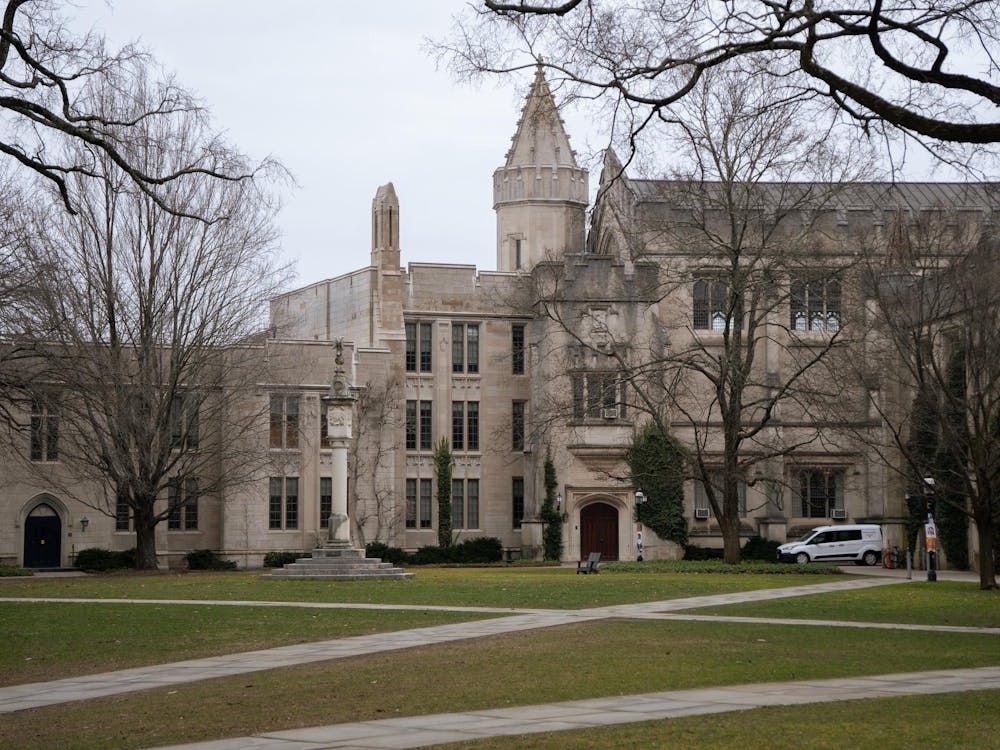The following is an open letter and reflects the author’s views alone. For information on how to submit a letter to the Opinion section, click here.
To the Board of Trustees of Princeton University:
We, the undersigned faculty of Princeton University, write to you about a matter of deep and urgent concern. On Friday morning, May 3, eighteen Princeton students began a hunger strike, eating nothing and drinking water only sparingly. These students’ blood pressures had dropped and their bodies had begun to consume their own tissue. One of the students was rushed to the hospital on the evening of Wednesday, May 8. As of today, on day nine with no food, thirteen students have broken their hunger strike. Seven more students have begun a hunger strike.
These students have chosen to undertake a hunger strike in order to show their solidarity with the Palestinian people of Gaza and the West Bank, who are being subjected to a genocidal assault by the State of Israel. Our students escalated their protest tactics in this way because the University administration — which is beholden to President Eisgruber ’83 and the judgment of your Board — had been unwilling to communicate with them. Although some communication channels have opened in the last couple of days, the University administration has a lot more work to do to facilitate meaningful, mutually respectful, and good-faith efforts toward seriously considering their demands. This includes the urgent need to divest from Israel until such time as it ceases its genocidal war against the Palestinian people of Gaza and until Israel comes into compliance with international law and ends its occupation of the West Bank, Gaza, East Jerusalem, and other Palestinian lands.
President Eisgruber has assiduously refused to engage directly with Princeton students on hunger strike at all. Instead, after just one meeting with our non hunger-striking student protesters, he has delegated the responsibility of further meetings with them to other administrators, while not once personally conveying his interest in or concern for the hunger strikers themselves. Despite the urgency of the hunger strikers’ situation, these administrators have yet to advance the talks toward a substantive discussion of the protesters’ demands.
This disregard for our students’ health and well-being would be appalling in any context. The fact that the Palestine Solidarity Encampment is now located on Cannon Green — visible from the offices of Nassau Hall — casts President Eisgruber’s decision not to acknowledge these students as especially callous.
The University has gone out of its way to make life difficult for these beleaguered, underslept, and already-hungry student protesters. The administration’s relentless refusal to allow students to set up tents as protection from the elements is predicated on a feeble and ad hoc rule executed on Wednesday, April 24, the day the administration caught wind of a leaked plan to establish a camp on Thursday, April 25. Furthermore, the administration’s fiat declared that anyone who engaged in an “encampment, occupation, or other unlawful disruptive conduct” would, after one warning, “be arrested and immediately barred from campus.” This is a draconian act, even by the standards of an elite hierarchical private institution such as ours.
Meanwhile, our students — and, now, our hunger-striking students as well — have had to contend with rain and cold weather as well as multiple threats of vandalism and property damage by counter-protesters. Students are not allowed to sleep at the encampment, and those who do fall asleep may be subject to arrest. On the morning of Tuesday, May 7, Public Safety officers removed a tarp students were using to shelter from cold, rain, wind, and — at other moments — extreme heat. This confiscation was justified on the grounds that student protesters are not allowed to erect a “structure” at the encampment, even though the definition of what constitutes a structure was never provided. Earlier, on Sunday, May 5, two belligerent actors vandalized the Princeton hunger strikers’ encampment. We pray nothing further happens to our peaceful student protesters.
The Princeton University administration should understand that the law loses its moral force when it becomes so detached from ethics and basic human decency. The administration is sacrificing its moral sense and its purported affiliation to human decency in the name of upholding arbitrarily designed and implemented campus rules and regulations. What explains such cruel treatment of these morally-courageous students who only demand to know why the University continues “business as usual” when the University portfolio is likely complicit in what the International Court of Justice has determined is a case of “plausible genocide” in Gaza? Does the Board of Trustees believe that this is a correct position — ethically, politically, or intellectually?
President Eisgruber’s email to the campus community on May 7 regurgitated the canard that Palestine Solidarity protesters at Princeton have plausibly demonstrated “antisemitic language and behavior.” He made this offensive suggestion without determining whether the alleged “antisemitic language and behavior” did in fact emanate from the student protestors, and if so, whether that alleged language and behavior could indeed be reasonably categorized as antisemitic. A substantial proportion of both the student and faculty movement — including their leadership — count numerous Jews among them, Jews with various relationships to Judaism, Jews with contrasting relationships to Zionism and Israel. Acceptance of the idea that there is a monolithic Jewish community that always thinks, feels, and acts the same way, may well lead to discrimination against those Jews who do not share the views of the State of Israel or its allies in the United States.
We are appalled that President Eisgruber has not released a single statement since Oct. 7 grieving or even acknowledging the toll taken in Palestinian blood and life — Israel has killed over 30,000 Palestinians in Gaza (with thousands more under the rubble and unaccounted for), including over 13,000 children. We are disappointed that President Eisgruber is unable to show true leadership in a moment when the University itself is under assault, and call on every university president in the country to call for an immediate and permanent cease-fire in Gaza and across the lands of Palestine/Israel.
President Eisgruber refuses to address the burning issue that every single university president, administrator, trustee, alumni, student, future student, and supporter of the University as a project in general should be terrified and outraged about: the question of scholasticide. There is not a single functional university left in Gaza: all have been destroyed, in part or in full. The absence of public sympathy, sensitivity, or solidarity on his part towards the incalculable scale of Palestinian loss, trauma, and terror in all of the President’s communiques raises grave questions about his capacity to govern this institution in the service of humanity.

We implore the Board of Trustees to closely monitor and investigate the inner workings of this administration. At this point, we Faculty have dwindling, if any, confidence that President Eisgruber is willing or able to address our concerns regarding the safety and well-being of our students, to grant them a good faith hearing where they can air demands without intimidation. Moreover, we also fear for the future of faculty and student governance at Princeton, whether by direct democracy, or “university-wide consensus,” as the University will likely continue to operate.
We strenuously urge you to exercise your authority as University Trustees and intervene in this rapidly-deteriorating situation. Play your role in protecting our students, preserving and enshrining the rights of all of us to speak, protest, and organize freely and safely; and join us in standing up for the just and decent cause that our students demand we pay attention to and act in order to stop: Israel’s genocide of the Palestinian people of Gaza.
Signed,
Max Weiss, Associate Professor of History
Dan-El Padilla-Peralta, Associate Professor of Classics
Ruha Benjamin, Alexander Stewart 1886 Professor of African American Studies
Naomi Murakawa, Associate Professor of African American Studies
Keeanga-Yamahtta Taylor, Hughes-Rogers Professor of African American Studies
Zahid Chaudhary, Associate Professor of English
Gyan Prakash, Dayton-Stockton Professor of History
Zia Mian, Senior Research Scholar and Co-Director, Program in Science and Global Security (SGS)
Divya Cherian, Associate Professor of History
Joshua Guild, Associate Professor of African American Studies
Jack Tannous, Associate Professor of History and Hellenic Studies
Eddie S. Glaude Jr., James S. McDonnell Distinguished University Professor of African American Studies
Chika Okeke-Agulu, Robert Schirmer Professor of Art and Archaeology and African American Studies
Muhammad Qasim Zaman, Professor of Near Eastern Studies and Religion
Lara Harb, Associate Professor of Near Eastern Studies
Mohamed Abou Donia, Associate Professor of Molecular Biology
Andrew Cole, Woodrow Wilson Professor of Literature, Department of English
Eldar Shafir, Class of 1987 Professor of Behavioral Science and Public Policy
Eduardo Cadava, Philip Mayhew Professor of English
Gayle Salamon, Professor of English
Curtis Deutsch, Professor of Geosciences and the High Meadows Environmental Institute
Tehseen Thaver, Assistant Professor of Religion
Mostafa Abdou, Postdoctoral Research Associate, Princeton Neuroscience Institute
Samuel A. Nastase, Associate Research Scholar and Lecturer, Princeton Neuroscience Institute
Judy Kim, Postdoctoral Research Associate
May Kosba, Postdoctoral Research Associate, Program in African Studies
Paola Estrada, Postdoctoral Research Associate
Aniruddhan Vasudevan, Lecturer in Anthropology
Elise A. Mitchell, Presidential Postdoctoral Fellow in History
Moamen Elmassry, Postdoctoral Research Fellow of Molecular Biology
Lidal Dror, Assistant Professor of Philosophy
Nicolas Sanchez-Rodriguez, Postdoctoral Research Associate, Society of Fellows
Lacy Feigh, Link-Cotsen Postdoctoral Fellow in the Society of Fellows and Lecturer in the Council of the Humanities and History
Sally Xie, Postdoctoral Research Associate
Anthar Darwish, Lecturer, Department of Molecular Biology
Nancy Coffin, Senior Lecturer, Near Eastern Studies
Junko Yamazaki, Assistant Professor, East Asian Studies
Merihan Alhafnawi, Postdoctoral Research Associate
Brooke Holmes, Susan Dod Brown Professor of Classics
Radhika Nagpal, Professor, Mechanical and Aerospace Engineering and Computer Science
Susana Draper, Professor of Comparative Literature
Molly Greene, Professor, Department of History, Seeger Center for Hellenic Studies
Karen Emmerich, Associate Professor, Comparative Literature
Colleen Asper, Lecturer, Lewis Center for the Arts
Lorgia García Peña, Professor, African American Studies and Effron Center
D. Vance Smith, Professor of English
Gillian Knapp, Professor Emerita of Astrophysical Sciences
Paul Nadal, Assistant Professor of English
Spyros Papapetros, Associate Professor, Department of Art and Archaeology
Fadi A. Bardawil, Visiting Associate Professor, Anthropology and Near Eastern Studies
Autumn Womack, Associate Professor of African American Studies and English
Aleksandar Hemom, Professor in Creative Writing, Lewis Center for the Arts
Jenny Greene, Professor of Astrophysics
Elizabeth Ellis, Associate Professor of History
V. Mitch McEwen, Assistant Professor, Architecture
Catherine Clune-Taylor, Assistant Professor, Program in Gender and Sexuality Studies
Guillaume Falmagne, Postdoctoral Research Associate
Rob Nixon, Barron Family Professor in Humanities and the Environment, HMEI and English
Anne McClintock, A. Barton Hepburn Professor, HMEI and GSS
Abdelrahman Hamdan, Postdoctoral Research Associate
Ayah Nuriddin, Cotsen Postdoctoral Fellow, Society of Fellows, Lecturer in the Council of the Humanities and African American Studies
Maral Sahebjame, Postdoctoral Research Associate, Center for Iran and Persian Gulf Studies
Adel Ardalan, Postdoctoral Research Fellow, Princeton Neuroscience Institute
Nathan Jessee, Postdoctoral Research Associate
Naveed Mansoori, Associate Research Scholar
M. V. Ramana, Visiting Professor, Princeton School of Public and International Affairs
Harini Kumar, Postdoctoral Research Associate
Jessica Ng, Postdoctoral Research Associate
Spencer Strub, Associate Research Scholar
Arthur Obst, Postdoctoral Researcher, University Center for Human Values and High Meadows Environmental Institute
Alejandro Vesga, Postdoctoral Research Associate
Shen-yi Liao, Visiting Faculty Fellow, University Center for Human Values








